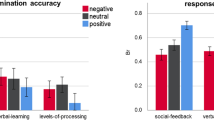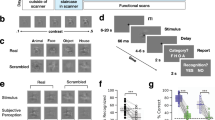Abstract
One presentation of a word to a subject is enough to change the way in which the word is processed subsequently, even when there is no conscious (explicit) memory of the original presentation. This phenomenon is known as implicit memory1,2,3. The neural correlates of implicit memory have been studied previously4,5,6,7,8,9,10,11, but they have never been compared with the correlates of explicit memory while holding task conditions constant or while using a procedure that ensured that the neural correlates were not ‘contaminated’ by explicit memory. Here we use scalp-recorded event-related brain potentials to identify neural activity associated with implicit and explicit memory during the performance of a recognition memory task. Relative to new words, recently studied words produced activity in three neuroanatomically and functionally dissociable neural populations. One of these populations was activated whether or not the word was consciously recognized, and its activity therefore represents a neural correlate of implicit memory. Thus, when task and memory contamination effects are eliminated, the neural correlates of explicit and implicit memory differ qualitatively.
This is a preview of subscription content, access via your institution
Access options
Subscribe to this journal
Receive 51 print issues and online access
$199.00 per year
only $3.90 per issue
Buy this article
- Purchase on Springer Link
- Instant access to full article PDF
Prices may be subject to local taxes which are calculated during checkout




Similar content being viewed by others
References
Graf, P. & Schacter, D. L. Implicit and explicit memory for new associations in normal and amnesic subjects. J. Exp. Psychol. Learn. Mem. Cogn. 11, 501–518 (1985).
Roediger, H. L. & McDermott, K. B. in Handbook of Neuropsychology Vol. 8(eds Boller, F. & Grafman, J.) 63–131 (Elsevier, Amsterdam, (1993).
Moscovitch, M., Vriezen, E. & Goshen-Gottstein, Y. in Handbook of Neuropsychology Vol. 8(eds Boller, F. & Grafman, J.) 133–173 (Elsevier, Amsterdam, (1993).
Squire, L. R.et al. Activation of the hippocampus in normal humans: a functional anatomical study of memory. Proc. Natl Acad. Sci. USA 89, 1837–1841 (1992).
Buckner, R. L.et al. Functional anatomical studies of explicit and implicit memory retrieval tasks. J. Neurosci. 15, 12–29 (1995).
Schacter, D. L., Savage, C. R., Alpert, N. M., Rauch, S. L. & Albert, M. S. Conscious recollection and the human hippocampal formation: evidence from positron emission tomography. Proc. Natl Acad. Sci. USA 93, 321–325 (1996).
Schacter, D. L.et al. Brain regions associated with the retrieval of structurally coherent visual information. Nature 376, 587–590 (1995).
Buckner, R. L.et al. Functional–anatomic correlates of object priming in humans revealed by rapid presentations f-MRI. Neuron 20, 285–296 (1998).
Allan, K., Wilding, E. L. & Rugg, M. D. Electrophysiological evidence for dissociable processes contributing to recollection. Acta Psychologica 98, 231–252 (1998).
Paller, K. A. & Gross, M. Brain potentials associated with perceptual priming versus explicit remembering during the repetition of visual word-form. Neuropsychologia(in the press).
Paller, K. A., Kutas, M. & McIsaac, H. K. An electrophysiological measure of priming of visual word-form. Conscious. Cogn.(in the press).
Paller, K. A. & Kutas, M. Brain potentials during retrieval provide neurophysiological support for the distinction between conscious recollection and priming. J. Cog. Neurosci. 4, 375–391 (1992).
Smith, M. E. Neurophysiological manifestations of recollective experience during recognition memory judgements. J. Cog. Neurosci. 5, 1–13 (1993).
Rugg, M. D. in Electrophysiology of Mind: Event-related Potentials and Cognition(eds Rugg, M. D. & Coles, M. G. H.) 132–170 (Oxford Univ. Press, Oxford, (1995).
Gardiner, J. M. & Java, R. I. in Theories of Memory(eds Collins, A. F., Gathercole, S. E., Conway, M. A. & Morris, P. E.) 163–188 (Earlbaum, Hove, (1993).
Gardiner, J. M., Java, R. I. & Richardson-Klavehn, A. How level of processing really influences awareness in recognition memory. Can. J. Exp. Psychol. 50, 114–122 (1996).
Mandler, G. Recognizing: the judgment of previous occurrence. Psychol. Rev. 87, 252–271 (1980).
Yonelinas, A. P. Receiver operating characteristics in recognition memory: evidence for a dual-process model. J. Exp. Psychol. Learn. Mem. Cog. 20, 1341–1354 (1994).
Hintzman, D. L. & Curran, T. Retrieval dynamics of recognition and frequency judgments: evidence for separate processes of familiarity and recall. J. Mem. Lang. 33, 1–18 (1994).
Ostergaard, A. L. & Jernigan, T. L. in Implicit Memory: New directions in Cognition, Development, and Neuropsychology(eds Graf, P. & Masson, M. E. J.) 327–349 (Erlbaum, Hillsdale, NJ, (1993).
Squire, L. R. Memory and Brain(Oxford Univ. Press, Oxford, (1987).
Tulving, E. & Schacter, D. L. Priming and human memory systems. Science 247, 301–306 (1990).
Allan, K. & Rugg, M. D. An event-related potential study of explicit memory on tests of word-stem cued recall and recognition memory. Neuropsychologia 35, 387–397 (1997).
Winer, B. J. Statistical Principles in Experimental Design 2nd edn(McGraw-Hill, New York, (1971).
McCarthy, G. & Wood, C. C. Scalp distributions of event-related potentials: an ambiguity associated with analysis of variance models. Electroenceph. Clin. Neurophysiol. 62, 203–208 (1985).
Jasper, H. A. The ten-twenty system of the international federation. Electroenceph. Clin. Neurophysiol. 10, 371–375 (1958).
Perrin, F., Pernier, J., Bertrand, O., Giard, M. H. & Echallier, J. F. Mapping of scalp potentials by surface spline interpolation. Electroenceph. Clin. Neurophysiol. 66, 75–81 (1987).
Acknowledgements
This research was supported by the Wellcome Trust. P.W. was supported by the Austrian Research Foundation, and K.A. by the Biotechnology and Biological Sciences Research Council, UK.
Author information
Authors and Affiliations
Corresponding author
Rights and permissions
About this article
Cite this article
Rugg, M., Mark, R., Walla, P. et al. Dissociation of the neural correlates of implicit and explicit memory. Nature 392, 595–598 (1998). https://doi.org/10.1038/33396
Received:
Accepted:
Issue Date:
DOI: https://doi.org/10.1038/33396
This article is cited by
-
Multi-Subject Analysis for Brain Developmental Patterns Discovery via Tensor Decomposition of MEG Data
Neuroinformatics (2023)
-
Behavioral and ERP effects of encoded facial expressions on facial identity recognition depend on recognized facial expressions
Psychological Research (2023)
-
The interactive effect of external rewards and self-determined choice on memory
Psychological Research (2023)
-
Effects of cognitive reappraisal on directed forgetting of negative emotional memory: an ERP study
Psychological Research (2023)
-
Word recognition memory and serum levels of Borna disease virus specific circulating immune complexes in obsessive–compulsive disorder
BMC Psychiatry (2022)
Comments
By submitting a comment you agree to abide by our Terms and Community Guidelines. If you find something abusive or that does not comply with our terms or guidelines please flag it as inappropriate.



